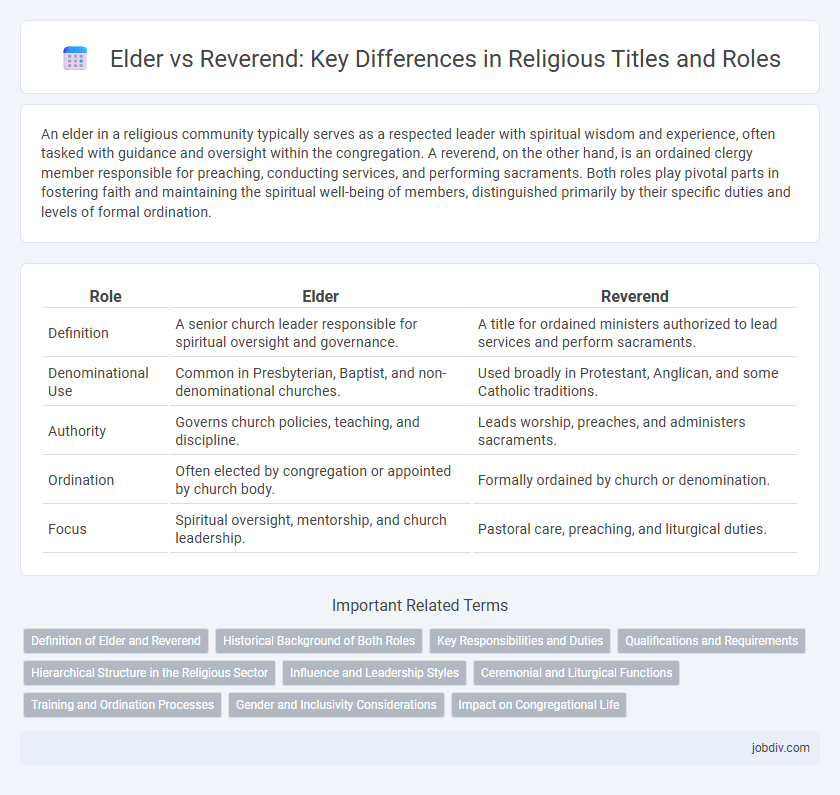An elder in a religious community typically serves as a respected leader with spiritual wisdom and experience, often tasked with guidance and oversight within the congregation. A reverend, on the other hand, is an ordained clergy member responsible for preaching, conducting services, and performing sacraments. Both roles play pivotal parts in fostering faith and maintaining the spiritual well-being of members, distinguished primarily by their specific duties and levels of formal ordination.
Table of Comparison
| Role | Elder | Reverend |
|---|---|---|
| Definition | A senior church leader responsible for spiritual oversight and governance. | A title for ordained ministers authorized to lead services and perform sacraments. |
| Denominational Use | Common in Presbyterian, Baptist, and non-denominational churches. | Used broadly in Protestant, Anglican, and some Catholic traditions. |
| Authority | Governs church policies, teaching, and discipline. | Leads worship, preaches, and administers sacraments. |
| Ordination | Often elected by congregation or appointed by church body. | Formally ordained by church or denomination. |
| Focus | Spiritual oversight, mentorship, and church leadership. | Pastoral care, preaching, and liturgical duties. |
Definition of Elder and Reverend
An Elder is a respected leader or officiant within certain Christian denominations, often responsible for spiritual guidance, governance, and pastoral care within the congregation. A Reverend is an honorific title used before the name of ordained clergy, signifying their role as a minister or priest authorized to perform religious rites and ceremonies. While "Elder" denotes a specific office or role within church hierarchy, "Reverend" primarily serves as a formal style of address for ordained Christian ministers.
Historical Background of Both Roles
The role of Elder dates back to early Christian communities, where it referred to spiritual leaders responsible for teaching, governance, and pastoral care, often serving as part of a plurality of elders within the church body. The title Reverend emerged in the Middle Ages as an honorific style used to denote respect for ordained clergy, especially priests and ministers who perform ecclesiastical duties and sacraments. Understanding these historical distinctions highlights the Elder's function as a governing authority in local congregations, contrasted with Reverend as a formal clerical title reflecting ordained ministry across various Christian denominations.
Key Responsibilities and Duties
Elders primarily oversee spiritual guidance, pastoral care, and church governance, ensuring doctrinal integrity and community support within the congregation. Reverends, often ordained ministers, focus on preaching, administering sacraments, and delivering sermons while providing leadership during worship services. Both roles emphasize servant leadership, but elders tend to have broader responsibilities in church administration and decision-making processes.
Qualifications and Requirements
Elders typically require ordination within certain Christian denominations, often emphasizing spiritual maturity, leadership experience, and a commitment to doctrinal teachings. Reverends usually hold formal theological education, such as a seminary degree, and must meet denominational licensing or ordination standards to perform sacraments and lead congregations. Qualification criteria for both positions vary by tradition but generally include a combination of education, experience, and recognized spiritual authority.
Hierarchical Structure in the Religious Sector
In the religious sector, the hierarchical structure distinguishes Elders and Reverends based on roles and responsibilities; Elders often serve as experienced spiritual leaders or governing members within a congregation or denomination, providing oversight and guidance. Reverends typically denote ordained clergy members authorized to lead worship services, perform sacraments, and offer pastoral care. The Elder's position may exist alongside or above the Reverend, depending on the specific religious tradition and organizational framework.
Influence and Leadership Styles
Elders typically exercise influence through a collective leadership model, emphasizing pastoral care, spiritual maturity, and community guidance rooted in biblical authority. Reverends often lead with formal ordination credentials, focusing on preaching, teaching, and administrative duties within established church hierarchies. Leadership styles of elders favor consensus-building and servant leadership, while reverends may adopt a more centralized or authoritative approach aligned with denominational structures.
Ceremonial and Liturgical Functions
Elders typically hold governance and pastoral care roles within congregations, often overseeing spiritual discipline and church administration, while Reverends primarily perform ceremonial and liturgical functions such as preaching, administering sacraments, and leading worship services. In many denominations, Elders may preside over ceremonies like weddings or funerals when ordained, but Reverends are specifically trained and authorized to conduct formal liturgical rites. The distinction reflects differing responsibilities: Elders emphasize spiritual guidance and church leadership, whereas Reverends focus on sacramental duties and public worship rituals.
Training and Ordination Processes
Elders typically undergo extensive theological education and practical ministry training, often within specific denominations like the Presbyterian or Methodist churches, before ordination. Reverends, a title commonly used for ordained ministers or priests, usually complete formal seminary training and meet denominational requirements for ordination, which can include examinations, internships, and pastoral evaluations. Both roles emphasize rigorous spiritual formation, but elders may also be appointed based on recognized leadership and service within the congregation.
Gender and Inclusivity Considerations
Elder traditionally holds a gender-neutral connotation within many Christian denominations, emphasizing a leadership role without specifying gender, thus fostering inclusivity in church governance. Reverend, while generally used as a formal title for ordained clergy, can reflect gender through specific variants like Reverend Father or Reverend Mother, though many communities adopt the gender-neutral "Reverend" to promote equality. Contemporary religious organizations increasingly prefer Elder for its inclusivity, aligning leadership titles with evolving gender sensitivity and diverse representation in ministry.
Impact on Congregational Life
Elders often serve as spiritual leaders who provide guidance, support, and accountability within the congregation, fostering a close-knit community and maintaining doctrinal integrity. Reverends, typically ordained ministers, lead worship services, deliver sermons, and administer sacraments, significantly influencing the congregation's spiritual growth and worship experience. Both roles are crucial, with elders focusing on internal community cohesion and reverends emphasizing public preaching and pastoral care.
Elder vs Reverend Infographic

 jobdiv.com
jobdiv.com